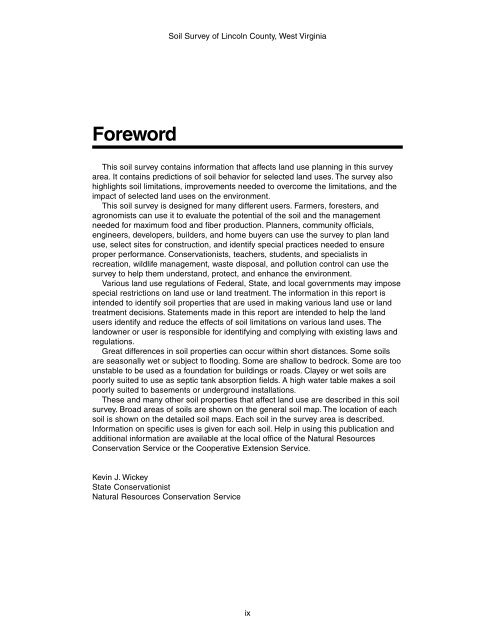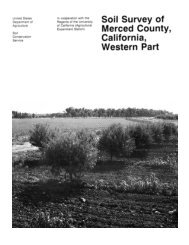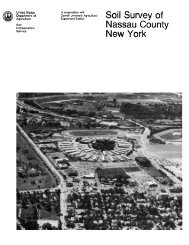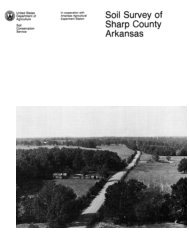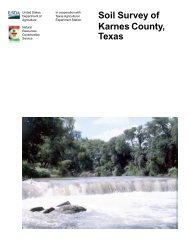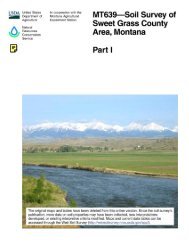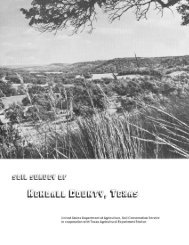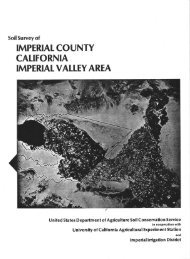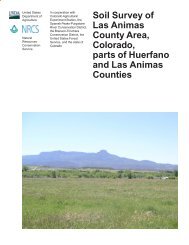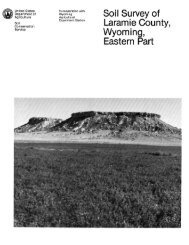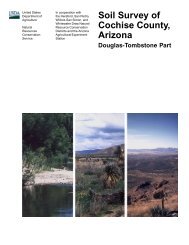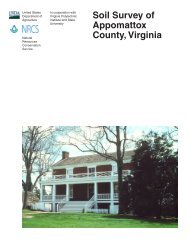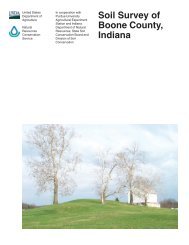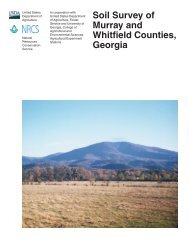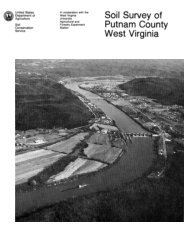- Page 1: United States Department of Agricul
- Page 4 and 5: Soil Survey of Lincoln County, West
- Page 6 and 7: Soil Survey of Lincoln County, West
- Page 8 and 9: Soil Survey of Lincoln County, West
- Page 13 and 14: Soil Survey of Lincoln County, West
- Page 15 and 16: Soil Survey of Lincoln County, West
- Page 17 and 18: Soil Survey of Lincoln County, West
- Page 19: Soil Survey of Lincoln County, West
- Page 22 and 23: Soil Survey of Lincoln County, West
- Page 24 and 25: Soil Survey of Lincoln County, West
- Page 26 and 27: 5. Gilpin-Upshur Soil Survey of Lin
- Page 29 and 30: Soil Survey of Lincoln County, West
- Page 31 and 32: Bedrock: 50 inches—shale and silt
- Page 33 and 34: Soil Survey of Lincoln County, West
- Page 35 and 36: Soil Survey of Lincoln County, West
- Page 37 and 38: Soil Survey of Lincoln County, West
- Page 39 and 40: Soil Survey of Lincoln County, West
- Page 41 and 42: Soil Survey of Lincoln County, West
- Page 43 and 44: Soil Survey of Lincoln County, West
- Page 45 and 46: Soil Survey of Lincoln County, West
- Page 47 and 48: Soil Survey of Lincoln County, West
- Page 49 and 50: Soil Survey of Lincoln County, West
- Page 51 and 52: Soil Survey of Lincoln County, West
- Page 53 and 54: Soil Survey of Lincoln County, West
- Page 55 and 56: Soil Survey of Lincoln County, West
- Page 57 and 58: Soil Survey of Lincoln County, West
- Page 59 and 60: Soil Survey of Lincoln County, West
- Page 61 and 62:
Soil Survey of Lincoln County, West
- Page 63 and 64:
Soil Survey of Lincoln County, West
- Page 65 and 66:
Soil Survey of Lincoln County, West
- Page 67 and 68:
Soil Survey of Lincoln County, West
- Page 69 and 70:
Soil Survey of Lincoln County, West
- Page 71 and 72:
Soil Survey of Lincoln County, West
- Page 73 and 74:
Soil Survey of Lincoln County, West
- Page 75 and 76:
Soil Survey of Lincoln County, West
- Page 77 and 78:
Soil Survey of Lincoln County, West
- Page 79 and 80:
Soil Survey of Lincoln County, West
- Page 81 and 82:
Soil Survey of Lincoln County, West
- Page 83 and 84:
Soil Survey of Lincoln County, West
- Page 85 and 86:
Soil Survey of Lincoln County, West
- Page 87 and 88:
Woodland ordination symbol: 5W Prim
- Page 89 and 90:
Soil Survey of Lincoln County, West
- Page 91 and 92:
Soil Survey of Lincoln County, West
- Page 93 and 94:
Soil Survey of Lincoln County, West
- Page 95 and 96:
Soil Survey of Lincoln County, West
- Page 97 and 98:
Woodland ordination symbol: 4R Prim
- Page 99 and 100:
Soil Survey of Lincoln County, West
- Page 101 and 102:
Soil Survey of Lincoln County, West
- Page 103 and 104:
Soil Survey of Lincoln County, West
- Page 105 and 106:
Soil Survey of Lincoln County, West
- Page 107 and 108:
Soil Survey of Lincoln County, West
- Page 109 and 110:
Soil Survey of Lincoln County, West
- Page 111 and 112:
Soil Survey of Lincoln County, West
- Page 113 and 114:
Soil Survey of Lincoln County, West
- Page 115 and 116:
Surface layer: 0 to 9 inches—brow
- Page 117 and 118:
Soil Survey of Lincoln County, West
- Page 119 and 120:
Soil Survey of Lincoln County, West
- Page 121 and 122:
Soil Survey of Lincoln County, West
- Page 123 and 124:
Soil Survey of Lincoln County, West
- Page 125 and 126:
Soil Survey of Lincoln County, West
- Page 127 and 128:
Soil Survey of Lincoln County, West
- Page 129 and 130:
Depth to bedrock: More than 60 inch
- Page 131 and 132:
Soil Survey of Lincoln County, West
- Page 133 and 134:
Soil Survey of Lincoln County, West
- Page 135 and 136:
Land capability classification: 3e
- Page 137 and 138:
Soil Survey of Lincoln County, West
- Page 139 and 140:
Soil Survey of Lincoln County, West
- Page 141 and 142:
Soil Survey of Lincoln County, West
- Page 143 and 144:
Soil Survey of Lincoln County, West
- Page 145 and 146:
Soil Survey of Lincoln County, West
- Page 147 and 148:
Soil Survey of Lincoln County, West
- Page 149 and 150:
Soil Survey of Lincoln County, West
- Page 151 and 152:
W—Water Soil Survey of Lincoln Co
- Page 153 and 154:
Soil Survey of Lincoln County, West
- Page 155 and 156:
Soil Survey of Lincoln County, West
- Page 157 and 158:
Soil Survey of Lincoln County, West
- Page 159 and 160:
Soil Survey of Lincoln County, West
- Page 161 and 162:
Soil Survey of Lincoln County, West
- Page 163 and 164:
Soil Survey of Lincoln County, West
- Page 165 and 166:
Soil Survey of Lincoln County, West
- Page 167 and 168:
Soil Survey of Lincoln County, West
- Page 169 and 170:
Soil Survey of Lincoln County, West
- Page 171 and 172:
Soil Survey of Lincoln County, West
- Page 173 and 174:
Soil Survey of Lincoln County, West
- Page 175:
Soil Survey of Lincoln County, West
- Page 178 and 179:
Soil Survey of Lincoln County, West
- Page 180 and 181:
Soil Survey of Lincoln County, West
- Page 182 and 183:
Soil Survey of Lincoln County, West
- Page 185 and 186:
Soil Survey of Lincoln County, West
- Page 187 and 188:
Soil Survey of Lincoln County, West
- Page 189 and 190:
C horizon: Hue—7.5YR to 2.5Y Valu
- Page 191 and 192:
Soil Survey of Lincoln County, West
- Page 193 and 194:
Cloverlick Series Soil Survey of Li
- Page 195 and 196:
Soil Survey of Lincoln County, West
- Page 197 and 198:
Soil Survey of Lincoln County, West
- Page 199 and 200:
Soil Survey of Lincoln County, West
- Page 201 and 202:
Soil Survey of Lincoln County, West
- Page 203 and 204:
Soil Survey of Lincoln County, West
- Page 205 and 206:
Soil Survey of Lincoln County, West
- Page 207 and 208:
Holly Series Depth class: Very deep
- Page 209 and 210:
Soil Survey of Lincoln County, West
- Page 211 and 212:
Soil Survey of Lincoln County, West
- Page 213 and 214:
Soil Survey of Lincoln County, West
- Page 215 and 216:
Matewan Series Depth class: Moderat
- Page 217 and 218:
Soil Survey of Lincoln County, West
- Page 219 and 220:
Soil Survey of Lincoln County, West
- Page 221 and 222:
Soil Survey of Lincoln County, West
- Page 223 and 224:
Soil Survey of Lincoln County, West
- Page 225 and 226:
Soil Survey of Lincoln County, West
- Page 227 and 228:
Sharpcrest Series Soil Survey of Li
- Page 229 and 230:
Soil Survey of Lincoln County, West
- Page 231 and 232:
Soil Survey of Lincoln County, West
- Page 233 and 234:
Value—3 or 4 Chroma—3 to 6 Text
- Page 235 and 236:
Soil Survey of Lincoln County, West
- Page 237:
Soil Survey of Lincoln County, West
- Page 240 and 241:
Time Soil Survey of Lincoln County,
- Page 242 and 243:
Soil Survey of Lincoln County, West
- Page 244 and 245:
Soil Survey of Lincoln County, West
- Page 246 and 247:
Soil Survey of Lincoln County, West
- Page 248 and 249:
Soil Survey of Lincoln County, West
- Page 250 and 251:
Soil Survey of Lincoln County, West
- Page 252 and 253:
Soil Survey of Lincoln County, West
- Page 254 and 255:
Soil Survey of Lincoln County, West
- Page 256 and 257:
Soil Survey of Lincoln County, West
- Page 258 and 259:
Soil Survey of Lincoln County, West
- Page 260 and 261:
Soil Survey of Lincoln County, West
- Page 262 and 263:
Soil Survey of Lincoln County, West
- Page 264 and 265:
Soil Survey of Lincoln County, West
- Page 266 and 267:
Soil Survey of Lincoln County, West
- Page 268 and 269:
Soil Survey of Lincoln County, West
- Page 270 and 271:
Soil Survey of Lincoln County, West
- Page 272 and 273:
Soil Survey of Lincoln County, West
- Page 274 and 275:
Soil Survey of Lincoln County, West
- Page 276 and 277:
Soil Survey of Lincoln County, West
- Page 278 and 279:
Soil Survey of Lincoln County, West
- Page 280 and 281:
Soil Survey of Lincoln County, West
- Page 282 and 283:
Soil Survey of Lincoln County, West
- Page 284 and 285:
Soil Survey of Lincoln County, West
- Page 286 and 287:
Soil Survey of Lincoln County, West
- Page 288 and 289:
Soil Survey of Lincoln County, West
- Page 290 and 291:
Soil Survey of Lincoln County, West
- Page 292 and 293:
Soil Survey of Lincoln County, West
- Page 294 and 295:
Soil Survey of Lincoln County, West
- Page 296 and 297:
Soil Survey of Lincoln County, West
- Page 298 and 299:
Soil Survey of Lincoln County, West
- Page 300 and 301:
Soil Survey of Lincoln County, West
- Page 302 and 303:
Soil Survey of Lincoln County, West
- Page 304 and 305:
Soil Survey of Lincoln County, West
- Page 306 and 307:
Soil Survey of Lincoln County, West
- Page 308 and 309:
Soil Survey of Lincoln County, West
- Page 310 and 311:
Soil Survey of Lincoln County, West
- Page 312 and 313:
Soil Survey of Lincoln County, West
- Page 314 and 315:
Soil Survey of Lincoln County, West
- Page 316 and 317:
Soil Survey of Lincoln County, West
- Page 318 and 319:
Soil Survey of Lincoln County, West
- Page 320 and 321:
Soil Survey of Lincoln County, West
- Page 322 and 323:
Soil Survey of Lincoln County, West
- Page 324 and 325:
Soil Survey of Lincoln County, West
- Page 326 and 327:
Soil Survey of Lincoln County, West
- Page 328 and 329:
Soil Survey of Lincoln County, West
- Page 330 and 331:
Soil Survey of Lincoln County, West
- Page 332 and 333:
Soil Survey of Lincoln County, West
- Page 334 and 335:
Soil Survey of Lincoln County, West
- Page 336 and 337:
Soil Survey of Lincoln County, West
- Page 338 and 339:
Soil Survey of Lincoln County, West
- Page 340 and 341:
Soil Survey of Lincoln County, West
- Page 342 and 343:
Soil Survey of Lincoln County, West
- Page 344 and 345:
Soil Survey of Lincoln County, West
- Page 346 and 347:
Soil Survey of Lincoln County, West
- Page 348 and 349:
Soil Survey of Lincoln County, West
- Page 350 and 351:
Soil Survey of Lincoln County, West
- Page 352 and 353:
Soil Survey of Lincoln County, West
- Page 354 and 355:
Soil Survey of Lincoln County, West
- Page 356 and 357:
Soil Survey of Lincoln County, West
- Page 358 and 359:
Soil Survey of Lincoln County, West
- Page 360 and 361:
Soil Survey of Lincoln County, West
- Page 362 and 363:
Soil Survey of Lincoln County, West
- Page 364 and 365:
Soil Survey of Lincoln County, West
- Page 366 and 367:
Soil Survey of Lincoln County, West
- Page 368 and 369:
Soil Survey of Lincoln County, West
- Page 370 and 371:
Soil Survey of Lincoln County, West
- Page 372 and 373:
Soil Survey of Lincoln County, West
- Page 374 and 375:
Soil Survey of Lincoln County, West
- Page 376 and 377:
Soil Survey of Lincoln County, West
- Page 378 and 379:
Soil Survey of Lincoln County, West
- Page 380 and 381:
Soil Survey of Lincoln County, West
- Page 382 and 383:
Soil Survey of Lincoln County, West
- Page 384 and 385:
Soil Survey of Lincoln County, West
- Page 386 and 387:
Soil Survey of Lincoln County, West
- Page 388 and 389:
Soil Survey of Lincoln County, West
- Page 390 and 391:
Soil Survey of Lincoln County, West
- Page 392 and 393:
Soil Survey of Lincoln County, West
- Page 394 and 395:
Soil Survey of Lincoln County, West
- Page 396 and 397:
Soil Survey of Lincoln County, West
- Page 398 and 399:
Soil Survey of Lincoln County, West
- Page 400 and 401:
Soil Survey of Lincoln County, West
- Page 402 and 403:
Soil Survey of Lincoln County, West
- Page 404 and 405:
Soil Survey of Lincoln County, West
- Page 406 and 407:
Soil Survey of Lincoln County, West
- Page 408 and 409:
Soil Survey of Lincoln County, West
- Page 410 and 411:
Soil Survey of Lincoln County, West
- Page 412 and 413:
Soil Survey of Lincoln County, West
- Page 414 and 415:
Soil Survey of Lincoln County, West
- Page 416 and 417:
Soil Survey of Lincoln County, West
- Page 418 and 419:
Soil Survey of Lincoln County, West
- Page 420 and 421:
Soil Survey of Lincoln County, West
- Page 422 and 423:
Soil Survey of Lincoln County, West
- Page 424 and 425:
Soil Survey of Lincoln County, West
- Page 426 and 427:
Soil Survey of Lincoln County, West
- Page 428 and 429:
Soil Survey of Lincoln County, West
- Page 430 and 431:
Soil Survey of Lincoln County, West
- Page 432 and 433:
420 Table 17.--Engineering Index Pr
- Page 434 and 435:
422 Table 17.--Engineering Index Pr
- Page 436 and 437:
424 Table 17.--Engineering Index Pr
- Page 438 and 439:
426 Table 17.--Engineering Index Pr
- Page 440 and 441:
428 Table 17.--Engineering Index Pr
- Page 442 and 443:
430 Table 17.--Engineering Index Pr
- Page 444 and 445:
432 Table 17.--Engineering Index Pr
- Page 446 and 447:
434 Table 17.--Engineering Index Pr
- Page 448 and 449:
436 Table 17.--Engineering Index Pr
- Page 450 and 451:
438 Table 17.--Engineering Index Pr
- Page 452 and 453:
440 Table 18.--Physical Properties
- Page 454 and 455:
442 Table 18.--Physical Properties
- Page 456 and 457:
444 Table 18.--Physical Properties
- Page 458 and 459:
446 Table 18.--Physical Properties
- Page 460 and 461:
448 Table 18.--Physical Properties
- Page 462 and 463:
Soil Survey of Lincoln County, West
- Page 464 and 465:
Soil Survey of Lincoln County, West
- Page 466 and 467:
Soil Survey of Lincoln County, West
- Page 468 and 469:
Soil Survey of Lincoln County, West
- Page 470 and 471:
Soil Survey of Lincoln County, West
- Page 472 and 473:
Soil Survey of Lincoln County, West
- Page 474 and 475:
Soil Survey of Lincoln County, West
- Page 476 and 477:
Soil Survey of Lincoln County, West
- Page 478 and 479:
Soil Survey of Lincoln County, West
- Page 480 and 481:
Soil Survey of Lincoln County, West
- Page 482 and 483:
Soil Survey of Lincoln County, West
- Page 484 and 485:
Soil Survey of Lincoln County, West


